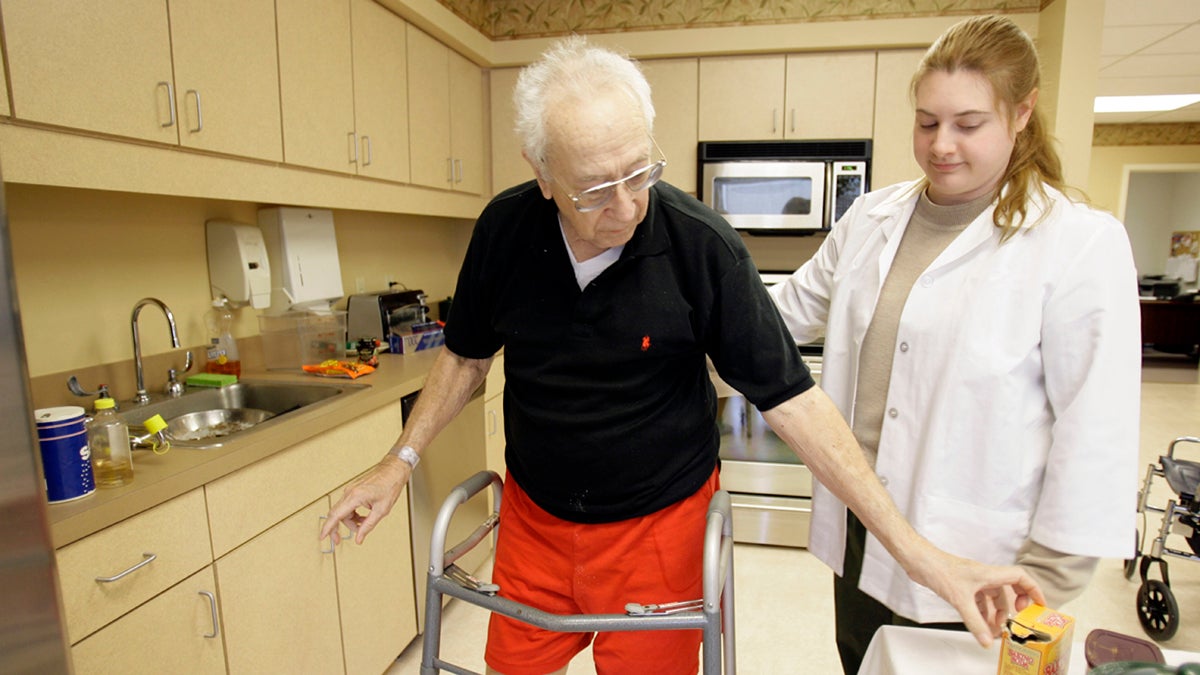Many rap private firm’s record on enrolling seniors for Pa. services

In this file photo a patient works with occupational therapist in Hatboro
Last year, Pennsylvania’s Department of Human Services awarded a $15 million contract to Maximus, an information-processing company, to manage enrollment for the state’s long-term care program.
The transition has not gone smoothly, leaving thousands of elderly and disabled Pennsylvanians waiting months to hear what’s happening with their applications.
Department officials said they’ve worked with Maximus to increase efficiency, but some Philadelphia-area agencies said they have not seen a significant improvement.
Throughout 2016, counties across Pennsylvania reported that Maximus had processed under 10 percent of applications for services designed to keep seniors out of nursing homes.
Enrollment numbers are going up, according to the department, with 62 percent of open cases resolved in December alone.
But Holly Lange, CEO of Philadelphia’s Corporation for Aging, remains underwhelmed.
“I’m sure the numbers they gave you are accurate,” said Lange. “But the local numbers are still not as efficient or effective as the numbers were before April 1, before Maximus took over.”
State Sen. Art Haywood, the Democratic minority chair of the Senate Committee on Aging and Youth, agreed, saying his office and the office of his Republican counterpart, Sen. Michele Brooks, have fielded numerous complaints from constituents statewide.
“There is a tremendous amount of anxiety and frustration in the community, which was not present under the prior enrollment system. So that also becomes a question of, ‘I had a friend or relative that didn’t have this problem in the past — what’s the problem now?'” said Haywood, who represents parts of Montgomery and Philadelphia counties.
Abrupt change in protocol
Before Maximus’ contract began in April, agencies on aging would send social workers to clients’ homes to help with paperwork. Because these agencies also assessed needs and referred clients to providers, the federal Centers for Medicare and Medicaid Services deemed Pennsylvania’s system a conflict of interest. Reimbursements for the program ended until the state moved toward a more diversified system.
Yet, advocates and caregivers said the new system isn’t designed with the needs of seniors in mind. These days, Maximus mails 56-page enrollment packets, along with a toll-free number for a call center.
Lori Shmukler, owner of Home Link Services, said her client base has decreased significantly since Maximus took over enrollment. She partially blamed Maximus for losing clients’ paperwork, as well as the complex application that some frail seniors and their families must tackle alone.
“The purpose of these programs is to keep people with the support they need to manage safely in the home,” said Shmukler. “And now we have such an arduous process to get them the services that they’re going to a nursing home or they’ve passed away while waiting to try and access these services.”
Questions to Maximus were referred by a representative to Pennsylvania’s Department of Human Services.
Human Services Secretary Ted Dallas said his office underestimated the time it would take for Maximus to get things working smoothly. The department has worked with Maximus to review staffing levels, he said, as well as the vendor’s policies and procedures.
Changes to the enrollment process are set against a larger plan to overhaul long-term care services. The $5 billion program is set to move toward a managed Medicare services by 2018. Maximus will have the opportunity to again bid for the contract during that transition.
Haywood and Brooks said, going forward, the state must be diligent in enforcing its expectations and contracts with private companies.
WHYY is your source for fact-based, in-depth journalism and information. As a nonprofit organization, we rely on financial support from readers like you. Please give today.

